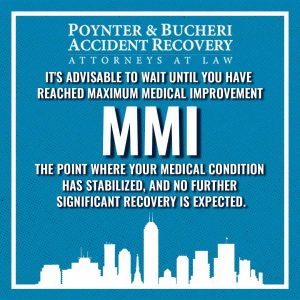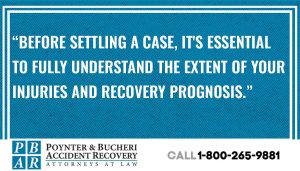
When Should I Settle My Personal Injury Case?

At Poynter and Bucheri Law Firm, we understand that navigating the legal system can be overwhelming, especially when dealing with an injury case. Our compassionate, experienced attorneys are here to guide you every step of the way.
One of the most crucial decisions you’ll face is when to settle your case. In this blog post, we’ll explore the factors to consider and provide valuable insights to help you make an informed decision.
What Is a Personal Injury Case?
An injury case or personal injury claim arises when an individual suffers harm due to another’s negligence or intentional act. Common examples include car accidents, slip and fall incidents, medical malpractice, product defects, workplace accidents, and other situations where someone is injured due to no fault of their own. Personal injury claims seek compensation for damages, such as medical expenses, lost wages, and pain and suffering.
At Poynter and Bucheri Law Firm, we believe in transparency and open communication throughout the entire settlement process or litigation process. We will keep you informed every step of the way through these complex cases, explaining the legal implications of any decisions and ensuring you have a clear understanding of your options.
The Legal Process
Understanding the legal process of a personal injury lawsuit is crucial.
Here’s a brief overview of the steps involved:
1. Filing a claim: The injured person/injured party, or plaintiff, files a personal injury claim via a demand letter against the other party responsible for the injury, known as the defendant.
2. Discovery phase: Both parties gather evidence, including medical records, witness statements, and other relevant documents to the claim on public record.
3. Negotiations: The lawyer and the insurance company engage in settlement negotiations to reach a fair agreement.
4. Trial preparation: If a settlement isn’t reached, the case proceeds to trial where both parties present their arguments and provide cross-examination.
5. Resolution: The case is resolved either through a personal injury settlement agreement or a court verdict.
Common Outcomes
Personal Injury claims typically end in one of three ways:
1. Settlement: The parties agree on a compensation amount for the claim without going to trial.
2. Trial verdict: A judge or jury decides the case if it goes to court.
3. Dismissal: The case may be dismissed if there’s insufficient evidence to support the personal injury claim.
Factors to Consider Before Settling
Deciding when to settle your injury case is a complex decision that requires careful consideration of various factors:
Extent of Injuries and Recovery

Before settling a case, it’s essential to fully understand the extent of your injuries and recovery prognosis. Settling too early might mean overlooking long-term medical expenses or future complications. It’s advisable to wait until you have reached maximum medical improvement (MMI) – the point where your medical condition has stabilized, and no further significant recovery is expected.
Financial Impacts
Consider the immediate and long-term financial impacts of your injuries. These include all your medical expenses (from emergency room visits to ongoing medical treatment), lost wages (compensation for time off work and future lost earning potential), and non-economic damages (pain and suffering, emotional distress, and reduced quality of life).
Emotional and Psychological Effects
Serious injuries often have emotional and psychological effects that might not be immediately apparent. It’s crucial to consider these impacts before settling your injury claim, as they can significantly affect your quality of life and ability to function.
Strength of Evidence
The strength of your evidence can significantly influence your decision to settle. Key pieces of evidence include medical records (documenting your injuries and medical treatment), witness statements (accounts from those who witnessed the accident), and expert testimony (insights from medical experts and other professionals).
Timing of Settlement
There are pros and cons to settling a claim early or waiting to recover:
Early Settlement
Pros:
- Quick resolution: Receive compensation faster, which can be crucial for immediate medical bills and living expenses.
- Less stress: Avoid the emotional and financial strain of a prolonged legal battle.
Cons:
- Potentially lower compensation: Early settlements might not fully cover future medical costs or lost income.
- Incomplete recovery: Settling before reaching MMI can result in underestimating long-term medical needs.
Waiting to Reach Maximum Medical Improvement
Pros:
- Full understanding of injuries: Reach MMI to fully understand the extent of your injuries and recovery needs.
- Potential for higher compensation: By waiting, you can better account for future medical costs and lost income.
Cons:
- Prolonged process: The legal process can be lengthy, often more than a year, adding to stress and uncertainty.
- Risk of a lower settlement offer: Insurance companies may offer less as time passes, hoping you’ll accept a lower amount.
Negotiation Strategies
Effective negotiation strategies can help achieve a fair settlement for your claim.
Here are some tips:
- Thorough documentation: Keep detailed records of your medical treatment, expenses, and any other relevant information.
- Professional assessment: Have your experienced personal injury attorney assess the value of your claim and provide guidance on a reasonable amount.
- Firm stance: Be prepared to reject initial low settlement offers from the insurance company, as they often start with lowball offers.
- Willingness to go to trial: While settling out of court is often preferred, being prepared to take the case to trial can strengthen your negotiation position.
Legal Advice

Consulting with an experienced personal injury attorney is crucial. A lawyer can provide valuable advice on the timing and amount of an offer, ensuring you don’t settle for less than you deserve. Their expertise as knowledgeable law firms can help you navigate the complexities of personal injury law and protect your rights throughout the process.
Benefits of Settling
While each case is unique, settling your case can offer several benefits:
- Certainty and closure: A settlement provides certainty and closure, allowing you to move forward without the unpredictability of a trial.
- Avoiding the stress of a trial: Trials can be stressful, time-consuming, and emotionally draining. Settling out of court avoids the emotional and financial burden associated with a trial.
- Guaranteed compensation: A settlement ensures guaranteed compensation, whereas a trial outcome is uncertain and may result in receiving nothing if the court rules against you.
Risks of Settling Too Early
While settling can be advantageous, it’s essential to be aware of the risks of settling too early:
- Underestimating future costs: Settling too early can lead to underestimating future medical expenses and lost income, which may result in insufficient compensation.
- Insufficient compensation: An early settlement might not fully cover all damages, leaving you financially strained in the long run.
- Pressure from insurance companies: Insurance companies often pressure personal injury claimants to settle quickly to minimize their payout. It’s essential to resist this pressure and consult with your lawyer.
Legal and Financial Considerations
When considering an offer, it’s crucial to consult with a knowledgeable personal injury attorney. They can assess the value of your case, negotiate with the insurance company, and ensure you receive fair compensation.
Understanding the legal and financial implications is also important:
- Settlement amount calculation: The calculation of a just settlement amount considers various factors, including medical costs, lost income, and non-economic damages like pain and suffering.
- Tax implications: While personal injury settlements are generally not taxable, some components, like lost income, might be subject to taxes. It’s essential to understand the tax consequences of any settlement.
Deciding when to settle your case is a critical decision that requires careful consideration of various factors, including how much compensation you need, the extent of your injuries, financial impacts, legal advice, and the potential risks and benefits of settling.
If you’re facing a personal injury lawsuit, including suffering injuries from a car accident, don’t hesitate to contact us for a free consultation. Our experienced legal team will thoroughly evaluate your injury claim, provide personalized guidance, and ensure you receive the amount you deserve for your claim.
FAQs on Settling Personal Injury Cases
How long does it typically take to settle a personal injury claim?
The personal injury case timeline varies, but most personal injury cases settle within a few months to a couple of years, depending on the case complexity, court calendar, and recovery timeline.
Can I settle my case without a lawyer?
While possible, it’s not advisable. An experienced attorney can negotiate a better settlement offer and protect your rights throughout the process.
What happens if I reject an offer?
Rejecting an offer can lead to further negotiations or taking the case to trial if a reasonable agreement can’t be reached.
How do I know if an offer is fair in my personal injury lawsuit?
Consult with your attorney, who can evaluate the offer based on the full extent of your injuries, medical care, and other damages. They can advise if the offer is fair for your claim or if you should continue negotiations for more money.
What should I do if the insurance company is pressuring me to settle?
Resist the pressure and consult with your personal injury lawyer. Insurance companies often try to minimize payouts, so it’s crucial to have an experienced advocate on your side to protect your best interests.
Contact Poynter & Bucheri Personal Injury Lawyer
Many factors come into play when deciding whether to accept an offer or pursue a lawsuit through a trial date. Our team at Poynter and Bucheri Law Firm will thoroughly evaluate all aspects of your case. We will also consider the strength of the evidence, such as witness statements, expert witness testimony, and any other relevant information gathered during the discovery process.
Ultimately, our goal is to secure the maximum compensation you deserve, whether through a settlement or by taking your case to trial if the other party or insurance company refuses to offer a reasonable settlement. We understand that most personal injury lawsuits can be complex, and each situation is unique. That’s why we take a personalized approach, working closely with you to understand your specific needs and circumstances.
If you or a loved one has been the victim of a serious injury due to someone else’s negligence, don’t hesitate to seek our help. We offer free consultations to discuss your case and determine the best course of action. Our experienced personal injury lawyers are here to fight for your rights and ensure you receive the compensation you deserve.
Remember to seek medical attention and preserve all evidence related to the accident scene as it is crucial for building a strong case. With our dedicated legal team by your side, you can focus on your recovery while we handle the legal complexities.
Contact Poynter and Bucheri Law Firm today at 1-800-265-9881 to schedule your free consultation. Let us be your trusted advocates and guide you through this challenging time. Together, we can work towards a fair outcome, whether through a settlement or by taking your case to trial.
